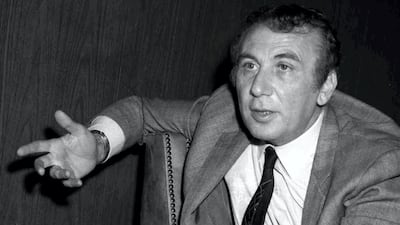There are some names in the Arab world that have become synonymous with the region’s culture and history. Nizar Qabbani is one of them. But who was Qabbani and why is his legacy important?
Qabbani was a poet who changed the art form in the Arab world forever. Not only did he use the medium to touch on subjects ranging from the personal to the universal, expressing love, grief and pride, but he also pointedly criticised and commented on society. His influence on how the language is used endures in various literary genres.
The Emirates Airline Festival of Literature, which runs until February 3, will be paying homage to the Syrian poet in their session Nizar Qabbani: Endless Love. The performance-based session will interpret many of Qabbani’s famous works, some of which have been adapted into songs in the region, for audiences. Tickets cost Dh75 for the session, on February 1 from 7.30pm to 8.30pm at the Intercontinental Hotel.
Here is why Qabbani remains such an influential figure in the Arab world.
Who was Nizar Qabbani?

Qabbani was born in 1923 in Damascus, a city which he often referred to as his “mother”. During his life he was a diplomat, artist, writer and poet. He is considered Syria's national poet and is one of the most revered contemporary poets in the Arab world.
He grew up in a neighbourhood of Old Damascus and attended the National Scientific College School in the city between 1930 and 1941, before studying law at Damascus University and graduating in 1945. During his time as a law student, Qabbani wrote and published his first collection of poems, titled The Brunette Told Me. The collection was considered controversial because of the sensual themes Qabbani wrote about.
Controversy, pushing the boundaries of what was considered acceptable to write about, and his approach to language in poetry were points of praise and critique throughout the writer's career. Love was a great theme in his earlier works but due to the political climate of the Middle East and incidents in Qabbani’s personal life, his focus shifted to Arab politics and society.
He was married twice. His first wife Zahra Aqbiq was his cousin and they had two children – Hadba, a daughter, and a son Tawfiq, who died at 22 from a heart attack. Qabbani eulogised his son in his famous poem To the Legendary Damascene, Prince Tawfiq Qabbani.
Qabbani’s second marriage was to Balqis al-Rawi, an Iraqi schoolteacher. The circumstances surrounding the start of their relationship have always been surrounded by romantic lore with many details not officially confirmed. However it is believed they faced obstacles against getting married because al-Rawi’s father disapproved of the match. Regardless, they were eventually married and had a son, Omar, and a daughter, Zainab.
Qabbani and al-Rawi were viewed by many as a couple that embodied many of the pan-Arabist ideals of the time, both of them committed activists on women’s rights and the Palestinian cause. However, in 1981 al-Rawi was killed when the Iraqi embassy in Beirut was bombed during the Lebanese Civil War. Al-Rawi’s death deeply affected Qabbani and many believe he never completely recovered from the loss.
He wrote one of his most famous poems, Balqis, during this time. Balqis is a significant work which does not only describe the grief of losing his wife, but it is also political relevant as Qabbani unleashed his rage, criticising and blaming the Arab world for her death.
Qabani left Beirut after al-Rawi’s death, taking refuge in Europe, where his poetry's focus shifted from love to political themes and criticism of Arab leadership.
In 1998, at the age of 75, Qabbani died in London of a heart attack. Over the course of a career that spanned more than half a century, Qabbani wrote over 30 books of poetry. He also wrote creative non-fiction in which he dealt with his relationship with poetry as a medium.
Significance of his poetry
Qabbani often wrote of romance, using used vivid imagery, nature and anatomy to describe passionate feelings of love and lust. But many of his works also tackled important social issues such as women’s rights and anti-colonialism, opposing western influence and projects in the region and advocating for Arab unity instead.
The 1967 Arab-Israeli war, in particular, was one of the first times political commentary appeared in his work.
Qabbani was also greatly influenced by the Arab region and particularly his birth city of Damascus, and Beirut, his adopted home for many years. Both cities were great muses, enabling him to explore themes of cultural identity, heritage and also criticism in his poetry.
Apart from his themes and subjects, Qabbani's poetic style also made him both popular and innovative. He broke away from traditional rhythmic and musical formations in Arabic writing, applying instead sentence structures, tone and cadence that were simpler and freer to describe immediate emotions. The evolving style created not only what many consider to be contemporary poetry but aligned with general artistic movements of the time and in turn made his work feel relevant.
Many of his poems were also adapted as lyrics for songs performed by some of the region's most celebrated artists. These included Egyptian singer and actor Abdel Halim Hafez, Lebanese singer Fairuz and Egyptian singer Umm Kulthum.
Why is he still important?

Qabbani, like many artists of his era, has become a cultural symbol for the region. His innovative approach to writing poetry remains influential among poets and writers working in Arabic. The way he combined colloquial vocabulary with classical Arabic sensibilities, making poetry accessible to a wider audience, changed how Arabs read and write poetry.
His work is not only an archive of the emotions, thoughts and experiences of Arabs at a time of great change for the region, but themes he explores, such as love, sensuality, cultural norms and societal changes, still spark discussions today.


